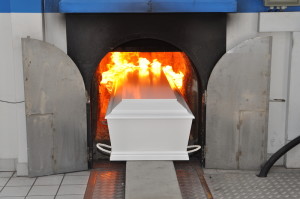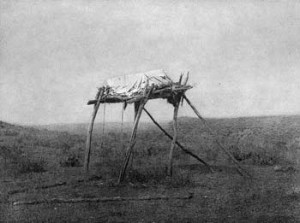by Sarah Adams -
Death happens. Death happens to all of us, once you are born you will die. Being prepared means being prepared for all aspects of life, and that includes death. And preparing for death includes what happens after death. It’s not a fun topic, in fact it is rather uncomfortable, but having a plan for your body after death relieves your family of at least one decision during a difficult time. Because what happens to your body is definitely a decision they will be asked to make.
One of the things that makes us human is the respect we show for the body after death. For most (all?) of human history there have been rituals surrounding the care and processing of a body after death. These rituals are not universal, they vary with time and culture, but that there is a ritual is universal.
There are many many options available to us today – cremation, embalming, burial in a casket, entombing, donation. What you choose might depend on your religion or family or culture. Do you know how you’d like your body cared for after your death? Does your family know what your wishes are?
Now, since we’re preppers, we need to ask how many of those would be available or practical in a collapse situation?
 A cremator generates temperatures between 1600-1800 degrees Fahrenheit. As far as I know, there’s no way to generate that kind of heat with easy to gather fuels. Modern embalming solutions include formaldehyde, methanol and other solvents. Not only would those materials be difficult to locate in a collapse situation, but people with the skills required to embalm without modern equipment and electricity are few and far between. Even burial is a challenge without modern excavation equipment — think about digging a deep enough hole by hand, now imagine doing it during a collapse. Many of the options we take for granted today would not be practical in a collapse situation.
A cremator generates temperatures between 1600-1800 degrees Fahrenheit. As far as I know, there’s no way to generate that kind of heat with easy to gather fuels. Modern embalming solutions include formaldehyde, methanol and other solvents. Not only would those materials be difficult to locate in a collapse situation, but people with the skills required to embalm without modern equipment and electricity are few and far between. Even burial is a challenge without modern excavation equipment — think about digging a deep enough hole by hand, now imagine doing it during a collapse. Many of the options we take for granted today would not be practical in a collapse situation.

So what options should we consider in a collapse? My suggestion would be to look at what native peoples indigenous to your region may have done. Their traditions were probably adapted to the locale. If you live near the coast an ocean burial may be an option. There are also the famous mounds of the Native Americans of the Mississippi River where bodies were “buried” in a mound of dirt instead of in a hole in the ground. Here in the Pacific Northwest it was common to practice “above ground burial” where a body was placed on a scaffold and left for the elements and animals.
I, personally, am a fan of some sort of exposure. In a pre-collapse world I’d like to be donated to the Body Farm; I would like my body to provide some use for science. In a post-collapse world, above ground burial or simple exposure in the forest works for me; my body is put to use, recycled into the circle of life.
The key, as always, is preparation. What do you want? Is it in writing? Does your family know?
